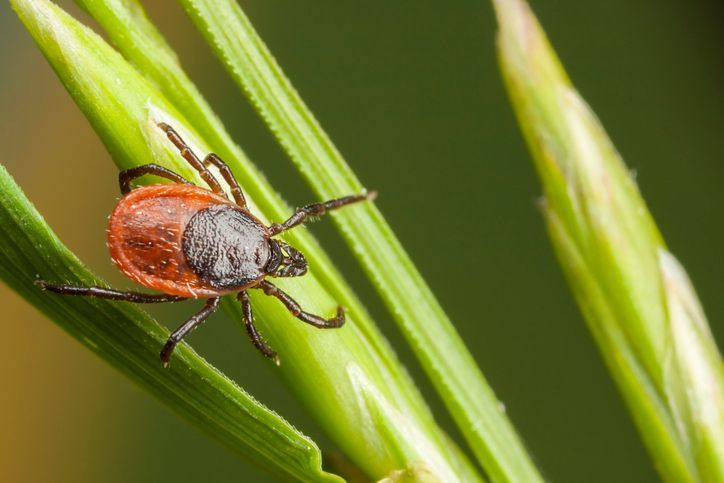ENVIRONMENTAL HEALTH SERVICES
The Environmental Public Health program is responsible for the following:
- Inspection of food service facilities, daycare centers and lodging establishments.
- Training food service workers and managers on safe handling of food and the Marion County Food Code.
- Work with realtors, home owners, and sewer system installers regarding the permitting and installation of new and existing sewer systems in Marion County. Contact the health department for current fees and also to fill out a permit application and schedule an on-site evaluation.
- Educating people about lead hazards, mold, rabies, and radon.
- Evaluation of private water supplies and waste water treatment systems.
- Investigations and/or consultations are provided for lead poisoned children , indoor air and mold, rabies, water testing, and other environmental issues.
For more information please click here or call 573-221-1166.
Tick Bites
For more information on ticks and tick-borne disease go to:
http://www.cdc.gov/ncidod/diseases/list_tickborne.htm
http://www.dhss.state.mo.us/TicksCarryDisease/

Ticks in the United States pose a significant threat to human health, causing more diseases than any other insect. These tick-borne diseases, also known as zoonotic diseases, can be transmitted between animals and humans. Protect yourself and your community by staying informed. Visit Marion County Health Department for more information.
Ticks are formidable disease vectors, capable of transmitting infections due to their ability to feed on numerous animals. At Marion County Health Department, we prioritize community health by raising awareness about the risks posed by ticks and providing resources to prevent tick-borne diseases. Stay informed and protect yourself from these tiny yet dangerous creatures.
At least six different human tick-borne diseases have been reported in Missouri. These include Rocky Mountain spotted fever, ehrlichiosis, tularemia, Q-fever, Lyme and Lyme like disease, and the southern tick-associated rash illness.
REMOVAL: If you find an attached tick, it should be removed promptly. The longer it is attached the greater the risk of infection. There are many “old wives tales” about how to remove a tick. However, to reduce the chance of disease transmission, correctly using tweezers or a commercial tick removal tool is preferred. The key to using tweezers correctly is to position the tips of tweezers around the area where the tick’s mouth parts enter the skin. Then use a slow, steady motion when pulling the tick away from the skin. After removing the tick, disinfect the skin with soap and water or other available disinfectants.
SIGNS/SYMPTOMS OF TICK-BOREN DISEASE: Signs and symptoms of tick-borne disease can vary among individuals. General symptoms include a sudden high fever, severe headache, muscle or joint aches, nausea, vomiting, or diarrhea. Other symptoms to be aware of include a rash or pus filled wound that appears at the site of a tick bite or a spreading rash that follows a tick bite. If these symptoms occur after a tick bite or exposure to tick habitat, inform your health care provider of the tick exposure.
PROTECT YOURSELF:
- Avoiding tick infested areas
- Wearing light colored clothing. This makes it easier to see ticks crawling on your clothes.
- Use chemical repellents with DEET, Picaridin, or permethrin. Adults should apply repellents to children and avoid putting the repellents on the child’s hands, eyes, and mouth.
- Check your body and your child’s body for ticks. Favorite areas for tick attachment include: under the arms, in and around the ears, inside the belly button, back of knees, in and around the hair, between the legs, and around the waist.
SOIL SCIENCE
This is a listing of soil scientists in our area, a state wide list is available upon request or by visiting the state of Missouri Department of Health Website.

Don Walker
1641 E. Co. Rd. 1800
Carthage, IL 62321
Cell: 217-779-3192
Office: 217-746-8601
Fax: 217-746-8601
Scott Wegman
Elijah’s Brook, Inc.
7030 Co. Rd. 308
Taylor, MO 63471
Cell: 573-541-7645
Fax: 573-393-1008
Gary Noel
54143 Hwy M
New London, MO 63459
Phone: 573-822-4916
Mitchell Feyerherm
909 S. Greenwood Ave.
Columbia, MO 65201
913-634-3175
Evelyn Mann
701D Crown Industrial Ct.
Chesterfield, MO 63005
Office: 314-341-3888
Cell: 636-399-3469
